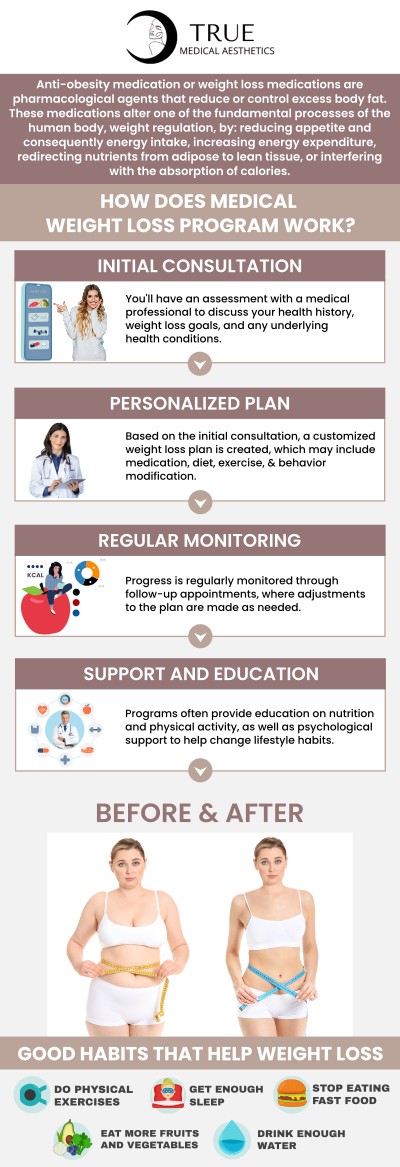Who Qualifies for Medical Weight Loss?
Medical weight loss is designed for individuals who struggle with weight management and need a structured, medically supervised approach to achieve their goals. At True Medical Aesthetics, Tristen Durkin and her team can help you with personalized plans to help you reach your goals. For more information, please contact us or schedule an appointment online. We are conveniently located at 50 Avon Meadow Ln, Avon, CT 06001.


Table of Contents:
What are the requirements for a medical weight loss program?
Who doesn’t qualify for medical weight loss?
What makes you a candidate for medical weight loss?
What are the FDA criteria for medical weight loss?
Are any medications I’m taking likely to interact with medical weight loss treatments?
What Makes Tristen Durkin, RN’s Medical Weight Loss Program Different?
To qualify for a medical weight loss program, individuals must meet specific health and medical criteria to ensure the program is safe and effective for their needs. While requirements may vary by provider, the primary factors considered include body mass index (BMI), medical history, and overall health status.
Most programs require a BMI of 30 or higher, classifying a person as obese, or a BMI of 27 or higher with weight-related health conditions such as diabetes, high blood pressure, heart disease, or sleep apnea. These conditions make medically supervised weight loss essential for improving overall health and reducing risks.
A full medical evaluation is typically required before starting the program. This may include lab tests, metabolic assessments, and a review of current medications to determine underlying factors affecting weight. Individuals with certain medical conditions or a history of eating disorders may need additional screening to ensure a medical weight loss program is appropriate for them.
Participants must also be willing to commit to lifestyle changes, including dietary modifications, increased physical activity, and behavioral counseling. Some programs may incorporate FDA-approved weight loss medications, requiring close supervision by a healthcare provider.
Ultimately, a medical weight loss program is designed for individuals who are ready to take a structured approach to weight loss and are committed to long-term changes. With proper medical supervision, these programs provide safe and sustainable solutions for achieving and maintaining a healthy weight.
Individuals who do not qualify for a medical weight loss program typically include those with certain medical conditions, lifestyle factors, or health concerns that make the program unsuitable or unsafe. One common reason for disqualification is having a body mass index (BMI) that falls within a healthy range, as medical weight loss is generally designed for individuals with a BMI of 30 or higher or a BMI of 27 with obesity-related conditions.
People with a history of eating disorders such as anorexia or bulimia may not be eligible, as medical weight loss programs focus on structured weight reduction, which could be harmful for individuals struggling with disordered eating patterns. Additionally, those with certain chronic illnesses, including severe liver or kidney disease, uncontrolled heart conditions, or untreated thyroid disorders, may not qualify if weight loss interventions pose health risks.
Pregnant or breastfeeding individuals are usually advised against starting a medical weight loss program, as weight loss efforts during pregnancy or postpartum can affect maternal and infant health. Some individuals may also be ineligible due to medication interactions, underlying mental health concerns, or an unwillingness to commit to necessary lifestyle changes.
A healthcare provider will conduct a full evaluation to determine if medical weight loss is safe and appropriate based on individual health needs and goals.
Being a candidate for medical weight loss depends on factors such as body mass index (BMI), medical history, and overall health status. Generally, individuals with a BMI of 30 or higher qualify, as this falls within the obesity range. Those with a BMI of 27 or higher who have weight-related conditions like diabetes, high blood pressure, sleep apnea, or heart disease may also be eligible, as losing weight can significantly improve these conditions.
A medical evaluation is typically required before starting the program. This may include lab tests to check for hormonal imbalances, metabolic issues, or other underlying factors affecting weight loss. Individuals who have struggled with traditional dieting and exercise but have not achieved sustainable results may be ideal candidates, as medical weight loss provides a structured and supervised approach tailored to their needs.
Additionally, candidates must be committed to making lifestyle changes, including improving nutrition, increasing physical activity, and following behavioral modifications. In some cases, FDA-approved weight loss medications may be prescribed, requiring regular medical monitoring.
Ultimately, a good candidate for medical weight loss is someone looking for a safe, science-backed approach to weight management, guided by healthcare professionals, to achieve long-term success and improved overall health.
The FDA criteria for medical weight loss focus on ensuring that weight loss treatments, including prescription medications, are safe and effective for eligible individuals. According to the FDA, candidates for medical weight loss typically include those with a body mass index (BMI) of 30 or higher, which falls within the obesity range. Additionally, individuals with a BMI of 27 or higher who have at least one obesity-related condition, such as type 2 diabetes, high blood pressure, or sleep apnea, may also qualify for FDA-approved weight loss treatments.
Before prescribing weight loss medications, the FDA requires healthcare providers to evaluate a patient’s overall health, medical history, and potential risk factors. Medications approved by the FDA for weight loss, such as appetite suppressants or metabolism regulators, must be used alongside a structured program that includes dietary changes, exercise, and behavioral modifications for optimal results. The FDA also monitors the safety of these medications, ensuring they meet strict guidelines for effectiveness and potential side effects.
Patients who do not meet BMI requirements or have contraindications, such as pregnancy, certain chronic illnesses, or a history of eating disorders, may not qualify under FDA guidelines. A healthcare provider will determine eligibility based on individual health needs and safety considerations.
Certain medications can interact with medical weight loss treatments, potentially affecting their effectiveness or leading to unwanted side effects. Before starting a medical weight loss program, it is important to inform your healthcare provider about any prescription or over-the-counter medications, supplements, or herbal remedies you are taking.
Some medications, such as those used to manage diabetes, high blood pressure, or depression, may require dosage adjustments when combined with weight loss treatments. For example, some diabetes medications like insulin or sulfonylureas can cause low blood sugar when used alongside appetite-suppressing medications. Similarly, certain antidepressants or anti-anxiety drugs may impact weight loss progress, either by affecting metabolism or increasing appetite.
Blood pressure medications and heart-related drugs may also require careful monitoring, as rapid weight loss can influence cardiovascular health. Additionally, some prescription weight loss medications, such as GLP-1 receptor agonists or stimulants, may not be recommended for individuals taking medications that affect the central nervous system.
A healthcare provider will assess potential interactions and may adjust your treatment plan accordingly. Regular monitoring and communication with your medical team are essential to ensure safe and effective weight loss while managing any existing health conditions.
Achieving and maintaining a healthy weight requires expert guidance and a comprehensive, personalized plan. At True Medical Aesthetics, the Medical Weight Loss Program is supervised by Tristen Durkin, RN, and her dedicated staff, focusing on your long-term holistic health.
Tristen, RN, and her team are committed to informed and individualized care, ensuring your weight management strategy aligns perfectly with your unique health needs and wellness goals. This program is part of the clinic’s broader Holistic Wellness Program, integrating medical oversight with essential lifestyle support, including fitness and nutritional services. True Medical Aesthetics is dedicated to helping you achieve both inner health and outer beauty. They offer the added convenience of accepting FSA/HSA for this program (check your individual plan details and required documentation), making it easier to invest in a healthier, more confident future under Tristen Durkin’s professional guidance.
Medical weight loss promotes significant weight loss by curbing appetite and increasing feelings of fullness, resulting in reduced calorie consumption. Its benefits include improved metabolic health, reduced risk of obesity-related conditions, and long-term weight management. Medical weight loss is available at True Medical Aesthetics. For more information, please contact us or schedule an appointment online. We are conveniently located at 50 Avon Meadow Ln, Avon, CT 06001. We serve clients from Avon CT, Simsbury CT, Canton CT, Bloomfield CT, Farmington CT, Burlington CT, and surrounding areas.
Check Out Our 5 Star Reviews


Additional Services You May Need
• Microneedling RF
• Body Sculp Laser Lipo
• Vitamin Injections
• IV Drip Vitamin Therapy
• Non-Surgical Face Lift
• Aquagold Deluxe Facial
• Dermaplaning Facial
• Laser Hair Removal
• Rosacea Treatment
• Tattoo Removal
• Hollywood Carbon Facial
• IPL Pigment Removal
• Laser Vein Removal
• Skin Tightening Laser Facial
• Radiesse Filler
• Chin Sculpt Fat Melting
• Hyperhidrosis Treatment
• PRF Hair Restoration
• PRF Under Eye Injections
• Lip Flip
• Dermal Filler
• Aquagold Deluxe Facial
• Botox
• Holistic Wellness
• Holistic Weight Management Program
• Glass Skin Program
• Breeze
• Dysport
• Emsculpt
• Lip Fillers
• Cheek Fillers
• Chin Fillers
• Jawline Fillers
• PDRN
• Facial Lymphatic Drainage
• IPL Laser Facial
• Erbium Yag Laser Facial
• Red Light Therapy
• Infrared Sauna
• Vitamin D
• Vitamin Complex
• NAD+ IV Therapy

Additional Services You May Need
• Microneedling RF
• Body Sculp Laser Lipo
• Vitamin Injections
• IV Drip Vitamin Therapy
• Non-Surgical Face Lift
• Aquagold Deluxe Facial
• Dermaplaning Facial
• Laser Hair Removal
• Rosacea Treatment
• Tattoo Removal
• Hollywood Carbon Facial
• IPL Pigment Removal
• Laser Vein Removal
• Skin Tightening Laser Facial
• Radiesse Filler
• Chin Sculpt Fat Melting
• Hyperhidrosis Treatment
• PRF Hair Restoration
• PRF Under Eye Injections
• Lip Flip
• Dermal Filler
• Aquagold Deluxe Facial
• Botox
• Holistic Wellness
• Holistic Weight Management Program
• Glass Skin Program
• Breeze
• Dysport
• Emsculpt
• Lip Fillers
• Cheek Fillers
• Chin Fillers
• Jawline Fillers
• PDRN
• Facial Lymphatic Drainage
• IPL Laser Facial
• Erbium Yag Laser Facial
• Red Light Therapy
• Infrared Sauna
• Vitamin D
• Vitamin Complex
• NAD+ IV Therapy








